|
|
|
Sort Order |
|
|
|
Items / Page
|
|
|
|
|
|
|
| Srl | Item |
| 1 |
ID:
115076
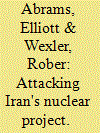

|
|
|
|
|
| Publication |
2012.
|
| Summary/Abstract |
A broad international coalition agrees that Iran must freeze its nuclear weapons program and may not develop either of the ingredients-sufficient highly enriched uranium and a usable warhead and delivery system-that could result in a bomb for the Islamic Republic. The International Atomic Energy Agency Board of Governors, the UN Security Council, and the governments of almost every influential country-including the United States, Russia, China, Germany, Britain, and France, acting as the P5+1 negotiating group-have not only reached consensus on this demand but acted upon it. Increasingly tough sanctions have been imposed on Iran to force it to stop what is obviously a military program aimed at building a usable nuclear weapon. These diplomatic steps and these tightened sanctions reflect a wide consensus about the dangers that an Iranian nuclear weapon would bring.
|
|
|
|
|
|
|
|
|
|
|
|
|
|
|
|
| 2 |
ID:
094041


|
|
|
|
|
| Publication |
2010.
|
| Summary/Abstract |
During the third quarter of 2009, there was a spate of reports in the news media and on the Internet accusing Burma and North Korea of engaging in a range of activities that potentially threatened regional security. It was claimed that the Naypyidaw regime had developed a close relationship with Pyongyang that included North Korea's sale to Burma of conventional weapons, assistance in the development of Burma's defence infrastructure and arms industries, and even collaboration on a nuclear weapons program. Given the lack of hard evidence, however, these reports raised more questions than they answered. Burma's nuclear status remains unknown. Another puzzle is why no government or international organisation has yet made an official statement on this particular issue, despite all the publicity it has attracted. Should it be determined that Burma does indeed have a secret nuclear weapons program, then a key question would be whether the generals are likely to be any more receptive to international concerns than they have been in the past, on other issues.
|
|
|
|
|
|
|
|
|
|
|
|
|
|
|
|
| 3 |
ID:
051872
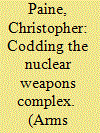

|
|
|
| 4 |
ID:
143690


|
|
|
|
|
| Summary/Abstract |
Why were economic sanctions able to produce successful political outcomes in Iran but not in North Korea during 2006–2015? Experts have argued that sanctions are not really effective in changing a state’s objectionable policies or behavior. However, such conclusions should not be drawn without a close examination of the complex environment under which sanctions are imposed. This paper attempts to identify the conditions of sanctions success by comparing the economic sanctions imposed on Iran and North Korea. It begins with a critical assessment of extant evaluations of sanctions imposed on North Korea to abandon its nuclear weapons program. Next, it examines Iran sanctions to identify the factors that facilitated the resumption of nuclear talks in 2013 and led to a political agreement in 2015. Subsequently, this is compared with North Korea sanctions to explain why sanctions were more effective in Iran. Finally, the paper extrapolates the conditions for sanctions success that incorporate the political and economic characteristics of the states involved as well as the sanctions policy per se. The paper concludes with a discussion of the lessons learned.
|
|
|
|
|
|
|
|
|
|
|
|
|
|
|
|
| 5 |
ID:
177831
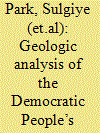

|
|
|
|
|
| Summary/Abstract |
The mining and milling of uranium ore is the first step in the production of fissile material and is a rate-limiting step for the indigenous production of nuclear weapons in the Democratic People’s Republic of Korea (DPRK). This study reports a geologic analysis of uranium mines in the DPRK in order to bound the state’s potential uranium production. The analysis suggests that the uranium deposits of the possible mines are of four types: (1) black shale (metamorphosed organic shale); (2) limestone; (3) granite/metasomatic; and (4) metamorphic deposits. Comparison with geologically-related, uranium-bearing host rocks in the Republic of Korea (ROK) indicate that DPRK uranium mines are associated with medium-to-high quantities of average low-grade ore (0.001–0.04 wt.% uranium). Using this low-grade ore, expansion of the state’s nuclear arsenal would require the extraction of larger quantities of uranium ore than has been previously assumed. The DPRK’s geology could, therefore, limit the future development of its nuclear weapons program.
|
|
|
|
|
|
|
|
|
|
|
|
|
|
|
|
| 6 |
ID:
141314
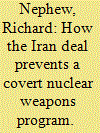

|
|
|
|
|
| Summary/Abstract |
On July 14, Iran and the six-country group known as the P5+1 (China, France, Germany, Russia, the United Kingdom, and the United States) reached an agreement on Iran’s nuclear program that promises to end the 13 years of escalating tensions that Tehran’s nuclear ambitions have caused.
|
|
|
|
|
|
|
|
|
|
|
|
|
|
|
|
| 7 |
ID:
119030


|
|
|
| 8 |
ID:
078644
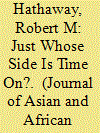

|
|
|
|
|
| Publication |
2007.
|
| Summary/Abstract |
President Bush's bold National Security Strategy document of September 2002 would appear to have been written with North Korea as much as Iraq in mind. Yet the Bush administration has been uncharacteristically passive in responding to the challenge posed by Pyongyang's nuclear weapons ambitions, especially in comparison with the forceful manner with which the administration dealt with Iraq. In the latter case, Bush mobilized the full weight of military force; seemed disdainful of allies, international institutions and multilateral diplomacy; and moved forward with what his critics deemed reckless abandon. In the case of North Korea, on the other hand, the President has emphasized patience, close coordination with allies and an overall lack of urgency oddly at variance with his `axis of evil' characterization of the regime in Pyongyang, and with dangerous advances in North Korea's nuclear arsenal. This essay attempts to explain the rationale behind the Bush administration's surprisingly relaxed approach to the North Korea challenge
|
|
|
|
|
|
|
|
|
|
|
|
|
|
|
|
| 9 |
ID:
127549
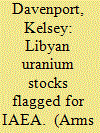

|
|
|
| 10 |
ID:
176136
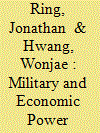

|
|
|
|
|
| Summary/Abstract |
Is the Kim Jong-un regime genuinely pursuing a peaceful solution, to eventually give up its nuclear arsenal, after a series of summits and negotiations with the US and South Korea? We examine how military and economic power networks on the peninsula are associated with the prospect of North Korea’s denuclearization. North Korea could use its nuclear weapons program, an internal tool designed to promote national security and power, to build up power in both military and economic power networks. Drawing lessons and speculation from the literature on states’ hedging behavior, and using agent-based models, we explain that denuclearization as part of a hedging strategy would be a viable policy option for North Korea.
|
|
|
|
|
|
|
|
|
|
|
|
|
|
|
|
| 11 |
ID:
111978


|
|
|
| 12 |
ID:
187226
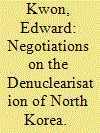

|
|
|
|
|
| Summary/Abstract |
This article analyzes a series of summit diplomacy efforts by the former United States President Donald Trump, and South Korea's President Moon Jae-in, to persuade North Korean leader Kim Jong Un to give up the country's nuclear weapons program. Through critical evaluation of the summits between Trump and Kim as well as Moon and Kim, the paper provides several important lessons on how to deal with North Korea. Kim Jong Un's mindset and strategic calculation of a denuclearization deal with Trump, amid the recent progress of North Korea's nuclear weapons and ICBMs programs, are investigated. Given the failure to reach a denuclearization agreement at the Hanoi Summit, Pyongyang is not expected readily to give up its nuclear weapons. North Korea had temporarily refrained from severe military provocations, such as test-firing ICBMs or conducting another round of nuclear weapon experiments by self-moratorium since April 2018. However, Pyongyang reversed direction with this policy in 2022 and resumed coercive diplomacy in order to achieve its desired goals. As North Korea's incessant efforts to advance its nuclear weapons and ICBMs programs brings with a dismal outlook for peace building both on the Korean Peninsula and the world, this paper investigates a series of policy lessons to manage the North Korean nuclear crisis.
|
|
|
|
|
|
|
|
|
|
|
|
|
|
|
|
| 13 |
ID:
153510
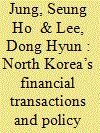

|
|
|
|
|
| Summary/Abstract |
This study investigates North Korea’s method of circumventing financial sanctions
based on a survey of 100 Chinese firms engaged in trade with North Korea, as
well as in-depth interviews with high-ranking North Korean defectors who have
professional experiences in the financial sector. Survey results indicate that North
Korea still prefers dollar–based financial transactions in trade settlements of a
certain size. In addition, this study categorizes North Korea’s circumventing
financial transactions by five methods: transactions via bank accounts under
borrowed names, cash depositories, paper companies, joint-venture banks, and
embassies. Lastly, this research presents policy implications to enhance the
effectiveness of financial sanctions.
|
|
|
|
|
|
|
|
|
|
|
|
|
|
|
|
| 14 |
ID:
107586
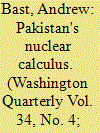

|
|
|
| 15 |
ID:
121698


|
|
|
|
|
| Publication |
2013.
|
| Summary/Abstract |
The United States is planning to slow down construction of the facility that is the centerpiece of its effort to get rid of plutonium withdrawn from its nuclear weapons program and is considering pursuing "an alternative plutonium disposition strategy," the Obama administration said last month in documents supporting its fiscal year 2014 budget request.
|
|
|
|
|
|
|
|
|
|
|
|
|
|
|
|
|
|
|
|
|